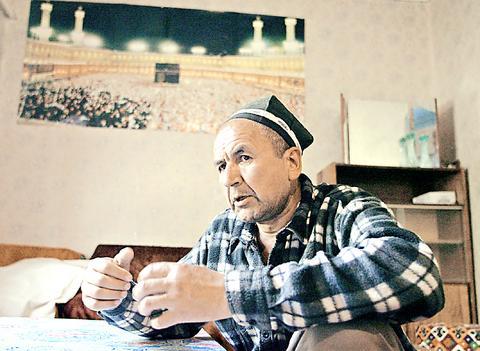Granted amnesty by the Uzbek government, Uigun Saidov turned in his Kalashnikov and sat back down at his pottery wheel.
He was returning to his Central Asian hometown after years on the run because he was part of an al-Qaeda-linked terror organization that joined the fight against US-led forces in Afghanistan that toppled the Taliban regime.

PHOTO: AP
Despite the government amnesty, Saidov was unrepentant about the aims of his former comrades-in-arms -- hundreds of whom he said still are hiding in Afghanistan and Pakistan.
"The Islamic Movement of Uzbekistan is in opposition to the government and its aim is to create an Islamic state," Saidov told reporters. The man, who looks younger than his 33 years, said he still believed in that goal.
Uzbekistan was shaken last week by four days of attacks and explosions that officials say killed at least 47, including 33 alleged terrorists.
A top anti-terror official has said the attacks were linked to the Wahhabi sect of Islam believed to have inspired Osama bin Laden. In the past, Uzbek officials have used that label when talking about the IMU.
The IMU was blamed for an alleged failed assassination attempt on President Islam Karimov in 1999 in which at least 16 others were killed. The organization also has been linked to incursions and kidnappings throughout Central Asia.
In Tashkent, the capital, Uzbek Foreign Minister Sadyk Safayev told journalists Sunday that he believed "the backbone of the IMU" had been broken during the anti-terror operations in Afghanistan after the Sept. 11 attacks. But he said "there might be several remnants of the IMU here." He gave no details.
"As a coordinated, centralized structure, I don't see any serious threat," he said.
Authorities have kept Saidov and his family under strict surveillance since his December return. After learning of the amnesty offer, he turned himself in at the Uzbek consulate in Karachi, Pakistan, along with his wife and three young children.
Saidov's father looked on with distrust as his son spoke to a reporter at the gates of the family's old one-story house in the outskirts of Navoi, 500km south of Tashkent.
Wearing a black-and-green shirt and jogging pants, Saidov began to talk only after a thorough check of his visitors' identification documents.
He said he had been trained at an IMU camp in neighboring Tajikistan's Tavildara region -- a former stronghold of the Tajik Islamic opposition that fought the secular government in a mid-1990s civil war.
Later, he said he was flown to Afghanistan in a military helicopter belonging to Russian troops stationed in Tajikistan.
"Our leader Juma Namangani had good ties with Russian military," he says. "They supplied us with weapons, clothes and other things."
The US military has said Namangani was killed in Afghanistan in late 2001, but no evidence has been publicly shown. Saidov said he did not know whether Namangani was dead or alive.
He said, however, that he believed reports last month that Pakistani troops injured the IMU's other top leader, Tahir Yuldash, in the Waziristan area on the Afghan border.
"He is there," Saidov said, adding that some 500 IMU fighters were still on the loose in Afghanistan and Pakistan.
However, Saidov denied that the IMU was behind the recent Uzbek attacks.
"I don't know whose hand that was. It's somebody new," he said.
Nearby, another man recently given amnesty after 3 years in an Uzbek prison for allegedly being a Wahhabi also denied involvement of that religious sect.

MONEY GRAB: People were rushing to collect bills scattered on the ground after the plane transporting money crashed, which an official said hindered rescue efforts A cargo plane carrying money on Friday crashed near Bolivia’s capital, damaging about a dozen vehicles on highway, scattering bills on the ground and leaving at least 15 people dead and others injured, an official said. Bolivian Minister of Defense Marcelo Salinas said the Hercules C-130 plane was transporting newly printed Bolivian currency when it “landed and veered off the runway” at an airport in El Alto, a city adjacent to La Paz, before ending up in a nearby field. Firefighters managed to put out the flames that engulfed the aircraft. Fire chief Pavel Tovar said at least 15 people died, but

LIKE FATHER, LIKE DAUGHTER: By showing Ju-ae’s ability to handle a weapon, the photos ‘suggest she is indeed receiving training as a successor,’ an academic said North Korea on Saturday released a rare image of leader Kim Jong-un’s teenage daughter firing a rifle at a shooting range, adding to speculation that she is being groomed as his successor. Kim’s daughter, Ju-ae, has long been seen as the next in line to rule the secretive, nuclear-armed state, and took part in a string of recent high-profile outings, including last week’s military parade marking the closing stages of North Korea’s key party congress. Pyongyang’s official Korean Central News Agency (KCNA) released a photo of Ju-ae shooting a rifle at an outdoor shooting range, peering through a rifle scope

South Korea would soon no longer be one of the few countries where Google Maps does not work properly, after its security-conscious government reversed a two-decade stance to approve the export of high-precision map data to overseas servers. The approval was made “on the condition that strict security requirements are met,” the South Korean Ministry of Land, Infrastructure and Transport said. Those conditions include blurring military and other sensitive security-related facilities, as well as restricting longitude and latitude coordinates for South Korean territory on products such as Google Maps and Google Earth, it said. The decision is expected to hurt Naver and Kakao

Gaza is rapidly running out of its limited fuel supply and stocks of food staples might become tight, officials said, after Israel blocked the entry of fuel and goods into the war-shattered territory, citing fighting with Iran. The Israeli military closed all Gaza border crossings on Saturday after announcing airstrikes on Iran carried out jointly with the US. Israeli authorities late on Monday night said that they would reopen the Kerem Shalom crossing from Israel to Gaza yesterday, for “gradual entry of humanitarian aid” into the strip, without saying how much. Israeli authorities previously said the crossings could not be operated safely during